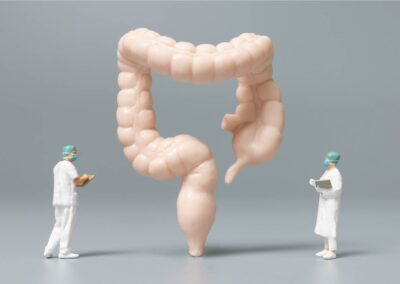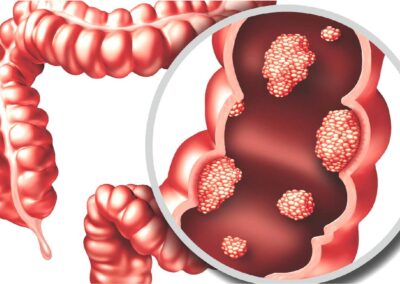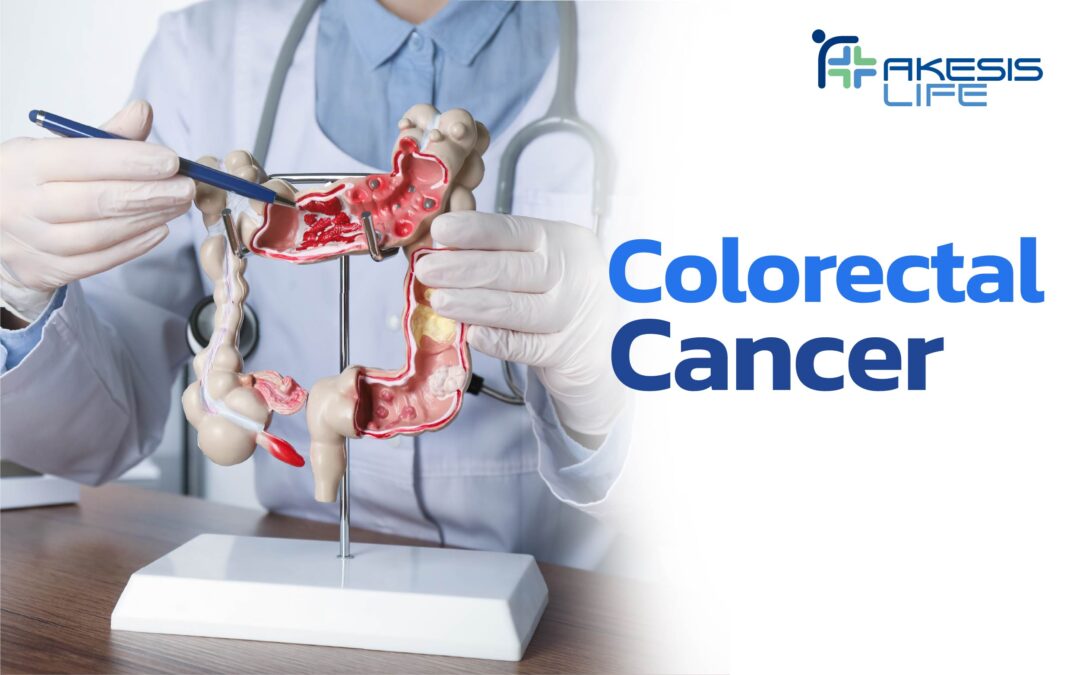Colorectal cancer is a malignancy caused by abnormal cell growth in the colon or rectum. The colon is part of the digestive system located after the stomach, responsible for absorbing water and minerals from digested food. The rectum is the final segment of the digestive tract, responsible for expelling stool from the body.
Colorectal cancer is the third most common cancer in men and the fourth most common in women. It primarily affects individuals aged 50 and above but can occur at any age and in any gender.
Although the exact cause of colorectal cancer remains unclear in conventional medicine, it is believed to result from multiple contributing factors, including:
- Advancing age
- Family history of colorectal cancer
- Chronic inflammatory bowel diseases
- Hemorrhoids
- Diets high in fat and red meat, low in fruits and vegetables
- Alcohol consumption and smoking

Conventional Medical Treatments for Colorectal Cancer
There are three main treatment options in conventional medicine: surgery, radiotherapy, and chemotherapy. These may be used individually or in combination depending on the cancer stage, patient condition, and other relevant factors.
- Surgery
Surgery is considered the primary treatment. It involves removing the affected section of the colon or rectum along with nearby lymph nodes. In advanced cases or tumors located near the rectum, a colostomy (artificial opening for stool passage through the abdomen) may be required.
- Radiation Therapy
This method uses high-energy radiation to destroy cancer cells. It can be used alongside surgery or chemotherapy—either to shrink the tumor before surgery or to eliminate residual cancer cells afterward.
- Chemotherapy
This involves the use of drugs to kill cancer cells. Like radiation, chemotherapy can be used before surgery to reduce tumor size or after surgery to destroy remaining cancer cells.

Additionally, Targeted Therapy may be employed alongside other treatments. These drugs specifically attack cancer cells with fewer side effects than conventional chemotherapy.
Treatment Guidelines by Stage
Stage | Description | Recommended Treatment |
Stage 1 | Cancer confined to the colon or rectum | Surgery (curative) |
Stage 2 | Cancer has invaded the submucosal layer | Surgery + Radiotherapy or Chemotherapy |
Stage 3 | Cancer has spread to muscular layers | Surgery + Radiotherapy or Chemotherapy |
Stage 4 | Cancer has metastasized to other organs | Chemotherapy + Radiotherapy or Targeted Therapy |
Side Effects of Treatment
Side effects vary depending on the treatment modality:
- Surgery: Pain at the surgical site, infections, wound dehiscence, bowel leakage, constipation, diarrhea, nausea, vomiting
- Radiation Therapy: Fatigue, nausea, vomiting, diarrhea, skin irritation, abdominal and back pain
- Chemotherapy: Fatigue, nausea, vomiting, hair loss, dry mouth, diarrhea, anemia, hepatitis, kidney failure

Severe side effects can lead some patients to discontinue or decline treatment. Outcomes are significantly influenced by the cancer stage:
Stage | Curability Rate |
Stage 1 | >90% |
Stage 2 | ~80% |
Stage 3 | ~60% |
Stage 4 | ~10% |
Early detection plays a crucial role in improving survival rates. In addition to cancer stage, other factors affecting prognosis include:
- Patient’s age and overall health
- Cancer cell type
- Expression levels of cancer-related genes
Integrative Medicine in Colorectal Cancer Care
Integrative Medicine is a complementary approach that combines conventional medical treatments with alternative therapies, focusing on the patient’s physical, emotional, and psychological well-being.
Integrative Approaches May Include:
- Lifestyle modifications: Adopting high-fiber diets, reducing red meat and high-fat foods, maintaining a healthy weight, and avoiding smoking and alcohol
- Herbal medicine and supplements: Such as turmeric, green tea, reishi mushroom
- Energy-based therapies: Acupuncture, therapeutic massage
- Mind-body therapies: Meditation, mindfulness practice

Benefits of Integrative Medicine:
- Symptom Relief: Helps alleviate pain, nausea, fatigue, constipation, and diarrhea through natural methods like herbs, acupuncture, or meditation
- Immune Support: Enhances immune function through nutritional therapy such as high-dose intravenous vitamin C, phytochemical infusions, medicinal mushrooms, and energy therapy
- Improved Quality of Life: Promotes better emotional well-being and resilience
Supporting Research
Some studies have shown the benefits of integrative approaches in colorectal cancer patients:
- Herbal supplements like turmeric, green tea, and reishi mushroom can reduce treatment-related symptoms like pain, nausea, and vomiting
- Energy therapies such as acupuncture and massage have been shown to help manage pain and digestive side effects
- Mind-body practices like meditation and mindfulness can help reduce stress, improve mood, and support overall quality of life
- https://www.cancer.org/cancer/types/colon-rectal-cancer.html
- https://www.cancer.gov/types/colorectal/hp
- https://www.cancer.org/cancer/types/colon-rectal-cancer/detection-diagnosis-
- staging/staged.html
- Feng Wang , Ming-Ming He, Zi-Xian Wang, Su Li, Ying Jin (2019). Phase I study of high-dose ascorbic acid with mFOLFOX6 or FOLFIRI in patients with metastatic colorectal cancer or
- gastric cancer. BMC Cancer.
- Myrna Brind Center of Integrative Medicine (2006). The Integrative Medicine Approach to
- Colorectal Cancer.


